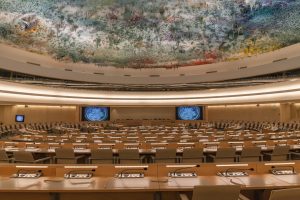Thailand takes a seat on the United Nations Human Rights Council in January for the first time, having campaigned since 2022 to get it. However, a decision late last month to forcibly deport six Cambodians for political reasons undermines the credibility of the seat.
The six–four women and two men–are supporters of the banned opposition party, the Cambodia National Rescue Party. They had made statements on social media that criticized the Cambodian government over the Cambodia-Laos-Vietnam Development Triangle Area, an agreement from which Cambodia has now withdrawn after widespread protests. But the six were deported from Thailand on November 24, and are being held in Cambodian prisons on charges of treason.
The U.N. Human Rights Council (HRC) was established in 2006 with a mission to “promote universal respect for the protection of all human rights and fundamental freedoms for all.” The council is tasked with the full implementation of human rights obligations made by states, and elected members are supposed to uphold the highest standards in protecting human rights. The council examines the human rights records of all U.N. member states every four years, creates investigative panels for specific countries, and appoints independent experts known as special rapporteurs.
Thailand prepares to take up its seat having carried out “a blatant violation of both Thai and international law,” says Emilie Pradichit, founder and executive director of the Manushya Foundation in Thailand. The fact that Thailand has not ratified the 1951 Refugee Convention carries no legal weight, she says. Thailand has ratified the International Convention for the Protection of All Persons from Enforced Disappearance as well as enacting its own Anti-Torture Act in 2023.
These, Pradichit says, are clear commitments to protect individuals from refoulement. Section 13 of Thailand’s Anti-Torture Act explicitly prohibits deportations to countries where torture is a risk.
Cambodia has a long and well-documented history of judicial and extra-judicial harassment of its opponents. The Cambodian journalist Mech Dara, imprisoned after reporting on cyber-scam compounds that implicated powerful Cambodian political and business figures, has now been released. Dara says he is giving up journalism. While he was in his tiny and crowded cell, he feared that he would not live to see the next day.
Thailand’s history of refoulements threatens to undermine the credibility of the HRC. Deportations carried out by Thailand include sending dissidents back to Myanmar, Laos, and Vietnam, as well as Cambodia. By its own admission, Thailand deported more than 100 Uyghurs to China in 2015.
Such a policy allows Thailand to pursue government opponents who have fled to other authoritarian countries. Wanchalearm Satsaksit was among the many activists who escaped Thailand after the country’s military coup in May 2014. He was forcibly abducted in broad daylight on the streets of the Cambodian capital Phnom Penh on June 4, 2020. Neither Cambodia nor Thailand has made a serious effort to investigate what happened to him.
The latest deportations have been carried out “without court review and in blatant disregard for fundamental refugee protection principles,” says Elaine Pearson, Asia director at Human Rights Watch based in Sydney. “Thai authorities should not be complicit in the Cambodian government’s transnational persecution of political opposition figures.”
The case appears to violate the international legal principle of non-refoulement which applies to all states, says Patrick Phongsathorn, senior advocacy specialist at Fortify Rights in Bangkok. The principle prohibits governments from deporting or transferring individuals to another country where they face serious risk of torture, persecution, or other human rights violations. Thailand is trying to join the Organization for Economic Co-operation and Development, as well as trying to sign a range of new trade deals, which gives the international community leverage to convince Bangkok to comply with domestic and international legal obligations to protect refugees, Phongsathorn says.
Thailand is now dangerous territory for political exiles and refugees fleeing repression because it is located in an “authoritarian neighborhood,” says Marcus Michaelsen, senior researcher in transnational repression at the University of Toronto’s Citizen Lab. Authoritarian governments in the same region are more likely to cooperate on transnational repression because they have a strategic interest in being surrounded by governments of a similar type, he says.
The deportations show the costs of the weakening of the West’s commitment to asylum seekers, Michaelsen says. Democratic states, he argues, need to recognize that authoritarian neighborhoods are high-risk zones for refugees from other repressive countries. So effective asylum and resettlement procedures that provide protection against political persecution are crucial.
The reality, he says, is that increasingly strict migration regimes and measures of border externalization in democracies push political emigrants farther away from the territory of liberal host states. “So exiles often remain trapped in third countries within these authoritarian neighborhoods.”
The Thai government’s public relations department has been approached for a response.

































